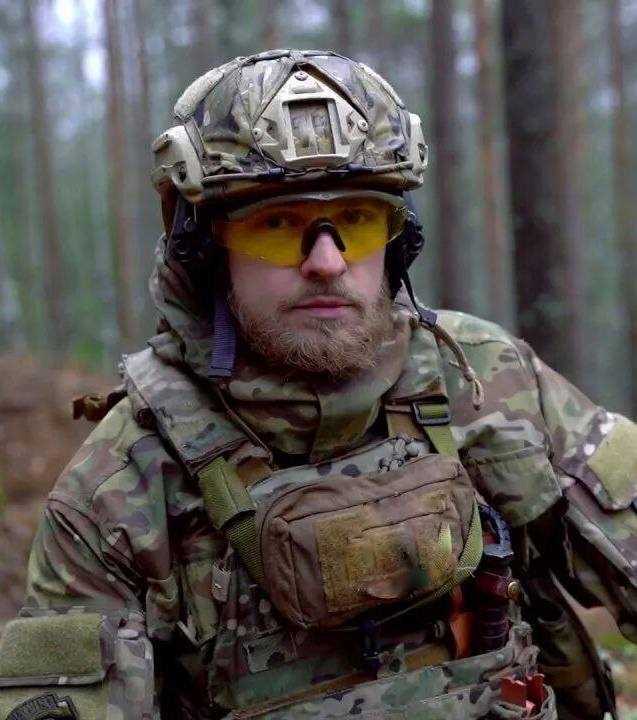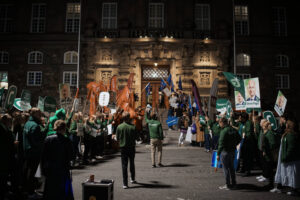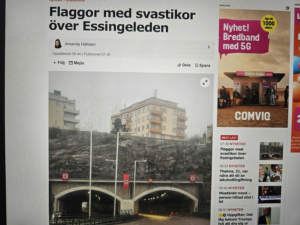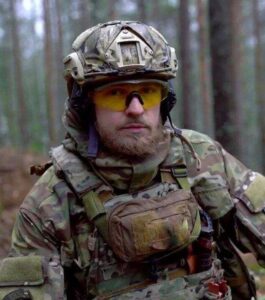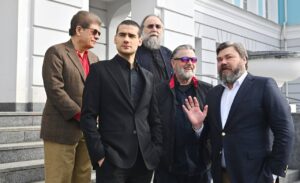Introduction
An alleged key fighter, founding member and leader of Russia’s best-known neo-Nazi unit Rusich, Yan Petrovsky, has been detained in Finland. Kyiv has sent an official request to Finnish authorities asking for the extradition of the 36-year-old Russian neo-Nazi.
Rusich, which is called a “Sabotage Assault Reconnaissance Group,” despite no longer really filling this function, is considered a sub-unit of Wagner, and was founded with the support of Petrovsky during the opening stages of the occupation of the Donbas as an explicitly neo-Nazi unit. The unit is among others known to use skull-masks, a symbol also associated with the international far-right Terrorgram and Accelerationist communities. The Ukrainian Prosecutor General and the International Criminal Court (ICC) have been investigating members of Rusich war crimes committed in Ukraine in 2014 and 2015.
According to court documents Petrovsky was involved in atrocities during fighting in Donbas in 2014 and 2015, according to the DPA news agency.
Ukrainian authorities suspect Yan Petrovsky of “participating in terrorist crimes that occurred in the period from June 2014 to August 2015 in the Luhansk and Donetsk regions.” At that time, the Rusich group took part in the fighting on the side of the so-called Donbass republics and became famous following a successful ambush near the village of Metalist against a group of Ukrainian far-right fighters from the Aidar unit on September 5, 2014.
Petrovsky is subject to EU sanctions and is banned from entering the European Union. According to Finnish media Petrovsky entered Finland on a residence permit granted using his “new name,” Voislav Torden. The permit was given on the basis of his wife’s studies at a Finnish university.
While he was trying to depart from Finland to travel to Nice, France, Petrovsky was apprehended and detained at Helsinki Airport on the 20th of July after border officials determined his identity based on intelligence. Petrovsky has claimed the reason for his trip to France was to visit family.
Reports about his residence permit became public, as the District Court of East Uusimaa ruled in favor of a police request to extend his detention indefinitely to facilitate the consideration of the extradition request to Ukraine.
His initial detention was on grounds of the violation of migration laws and the provision of inaccurate personal data.
According to Petrovsky’s legal counsel Natalia Malgina, Petrovsky entered Finland by car through the checkpoint Vaalimaa on July 19, accompanied by his wife and three children. She told Finnish news on Saturday that her client admitted to participating in “political activity” in Eastern Ukraine in 2014, but that he denies having participated in fighting or the carrying out of terrorist acts, as per the request for extradition.
During the hearing to extend his detention his lawyer made it clear that Petrovsky intends to seek asylum in Finland. Petrovsky and his legal counsel are taking deliberate steps to avoid extradition to Ukraine or to delay the extradition process as much as possible, as they believe that his life is threatened. According to Malgina “He certainly wouldn’t make it to the Ukrainian courtroom alive.”
Rusich against Russia
On August 25, representatives of the Rusich stated in their Telegram channel that Petrovsky, who goes by the nickname Slavyan was detained in Helsinki:
“Slavyan was detained a month ago. Information was not brought to the media intentionally, in the interests of the person and the cause.”
Following this, Rusich made a number of high-profile statements accusing the Russian Foreign Ministry of refusing to help its citizen, who shed blood for his country in the war.
Rusich has also declined to take part in further warfare until the Russian government backs their demand for support for Petrovsky.
“The Russian Foreign Ministry did not react to this either publicly or behind the scenes. In no way at all. Since July 20, Yan Petrovsky has not been visited by a Russian consul or lawyer. Despite the fact that Slavyan’s wife independently knocked in writing to the Ministry of Foreign Affairs and the Presidential administration of the Russian Federation. Today’s public reaction to the situation from the Ministry of Foreign Affairs of the Russian Federation is connected only with the fact that Yan Petrovsky was transferred to prison, where according to the latest news he will not be deported to Russia after paying the fine, but extradited, which has already been requested by Ukraine,” the neo-Nazis said in their own channel.
In response to the statements from Rusich, the Russian Embassy in Finland issued a detailed response on the details surrounding the detention of Petrovsky on August 26. In the response the Russian diplomats made it clear that Petrovsky was held in a temporary accomodation center where asylum seekers are held. The Embassy reassured that Petrovsky had access to a phone and could have contacted the embassy, but had not done so. A request from Petrovsky would have been required to get consular assistance at an earlier stage.
The Russian Embassy further noted that Petrovsky had been represented by a local lawyer since late July. The embassy learned from local police that the person initially detained under the name Torden was Petrovsky on August 23rd when changes in measures of restraint were imposed following the request for extradition to Ukraine.
On the 23rd of August, Petrovsky sent a personal appeal to the embassy. This allowed diplomats to “immediately take measures to assist the Russian citizen” and begin negotiations for a consular visit to him.
“The fact that the Finnish residence permit holder V. I. Torden appears on the sanctions lists as Y. I. Petrovsky and may be wanted by the Ukrainian authorities, was not reported at that time,” the diplomats said. According to them, the Russian Embassy did not receive personal appeals from Torden, so it could not provide proper consular assistance. The issue of Petrovsky’s extradition to Ukraine, the Russian embassy noted, will be considered later.
Rusich on the other hand have made claims that the Russian consulate was notified about the detention and interrogation of Yan Petrovsky by the Security Service of Ukraine (SBU). According to their statement “there was no reaction from it (the consulate). This was taken advantage of by the SBU officers, who expectedly conducted the interrogation, exerting “light physical” and psychological influence on Slavyan, including threatening his family and his wife directly with sexual violence. In turn, Yan Petrovsky, if in protocol language, resisted, and if in Russian, he kicked one of the SBU officers, breaking the latter’s nose and biting his ear (according to other sources, biting it off). After that he was transferred to the Helsinki prison.“
“Extradition to Ukraine is tantamount to 15-20 years, or even a life sentence,” Rusich writes.
Rusich fled the war
On August 25, the Rusich-group neo-Nazis declared they would refuse to take part in hostilities until the situation with Slavyan was resolved. “If the country cannot protect its citizens, why should the citizens protect the country?” – they asked. Rusich’s loud statement provoked a discussion in the Russian media. To some, the Rusich fighters were respected veterans of an unfinished war; to others, they were neo-Nazis.
Marina Akhmedova, a member of the Presidential Human Rights Council, pointed out that the unit was made up of Russian neo-Nazis who were engaged in blackmail:
“Here is where the difference between state armies and private armies is very striking. No brigade of the Ministry of Defense will ever say: “I have claims, I stop fighting”. This is pure blackmail. I don’t see the Russian soldier as a blackmailer. As for my personal attitude (it’s my blog, I can express it). I do not accept Nazism under the Ukrainian or Russian flag. Fortunately, in our country it is not accepted at the state level, unlike in Ukraine. And Nazism in our country is rather deeply marginalized. And participation in hostilities in Donbass since ’14 is not an indulgence for Nazism at all. I don’t know why these people went to fight then. For the freedom of Donbass or for love of blood. So if you are a Nazi, it is just an unfortunate fact of your biography. So crawl into a dark corner, sit there, keeping a low profile, and solve purely personal accumulated affairs. And don’t blackmail me through service to the Motherland (if that’s what it is).“
On this statement Rusich, and its likely commander Alexey “Fritz” Milchakov, to whom this address was intended, responded in a rude misogynistic manner.
“The opinion of such females, cackling in the network, we have little interest in (apparently decided to get an article for discrediting servicemen) as well as a bunch of potatoes who from the couch tell us what to do and what not to do (you clowns, write a statement on us to the prosecutor’s office – add toilet paper to the investigator).”
Other well-known far-right veterans spoke in defense of Yan Petrovsky. Neo-Nazi Mikhail “Pitbull” Turkanov, who commands a unit of the Española all-fans’ squad, also recorded a video in defense of Slavyan and threatened Finland if it hands over his comrade to Ukraine. As a result, on August 27, Milchakov asked to no longer threaten “the Russian Ambassador in Finland, as they have turned on the work“.
Rusich is a combat unit of Russian neo-Nazis, which is part of the PMC Wagner. The number of fighters in the unit is unknown. It likely only consists of a couple dozen fighters. In the group’s Telegram channel “DSHRG Rusich” they have repeatedly supported the most brutal practices of combat operations, including the killing of prisoners. The group’s founder is Alexey Milchakov; Yan Petrovsky is reportedly his deputy and commander of the “Zimargl” operational and reconnaissance unit within Rusich.
The founder and head of the scandalously famous PMC Wagner Yevgeny Prigozhin died in a plane crash on August 23, only a few days before the detention of Petrovsky became publicly known. The story of Petrovsky has thus been coming out amidst a backdrop of disturbing news for the neo-Nazis.
In the past weeks, the neo-Nazis on the Russian side have lost a powerful patron in Prigozhin, and risk becoming completely dependent on the Russian Ministry of Defense. The Ministry was in an open conflict with Prigozhin, causing thunderclouds on the horizon for the far-right network surrounding his leadership and Wagner.
Rusich has in the past openly supported Prigozhin’s attempted military coup. It’s thus natural to suspect that Milchakov and the group have found a convenient excuse to escalate conflict with Russian authorities in response to the detention of Petrovsky as a convenient cover to flee the battlefield.
It’s obvious the demands posed by Rusich and Milchakov to the Russian Foreign Ministry are inappropriate and impossible to fulfill.
It’s also worth considering Petrovsky of his own volition traveled to Finland. Finland has recently become a member of NATO in light of the evolving security threats posed by the war in which Petrovsky took active part. The true motive behind Petrovsky’s attempt to depart from Finland, under the guise of traveling to Nice to meet his relatives, also remains in question.
In reality, the Russian neo-Nazi still has a large network of far-right contacts in Europe, and across the NATO area, with whom he maintains close relations.
The Nordic Network of Petrovsky
Yan Petrovsky was born in Irkutsk. After his parents divorced he and his mother moved to St. Petersburg. In 2004, at the age of 16, he moved from St. Petersburg to the city of Tønsberg in Norway, following his mother’s remarriage.
He spent his youth in Norway and studied graphic design in Oslo. He also developed strong ties to the far-right community in the south of Norway, including to central members of the Nordic Resistance Movement.
In 2010 he was working at “True Metal Tattoo” a tattoo shop in Oslo which caught the attention of the police as a gathering place for the far-right movements. The police confiscated forged documents and weapons from the shop. The investigation that followed revealed that the weapons belonged to Russia neo-Nazi Viacheslav Datsik.
In 2011, during one of many trips back to Russia Petrovsky met Aleksey Milchakov. Milchakov was a young nationalist in St. Petersburg with an interest in weapons. To the public he is perhaps best known for beheading a puppy and eating it. The two became friends and later founded the Rusich sabotage and assault group as part of Alexander Bednov’s Batman battalion of the so-called Luhansk People’s Republic. The group was composed of nationalists from major Russian cities, and as Petrovsky puts it “other cities of the Rus.”
During his 2014 and 2015 participation in the Russian warfare in eastern Ukraine, Norwegian authorities issued a notice revoking his arms license. Petrovsky contested this, arguing that it was not written that he was not allowed to take part in armed conflict.
In 2016, after returning from Ukraine Petrovsky became a central member of the far-right vigilante group Soldiers of Odin. Shortly after his return from Ukraine Petrovsky, then 29, was, however, stripped of his residence permit and deported from Norway as he was considered a threat to national security. Petrovsky claims he became the target of political persecution carried out by the Norwegian police.
At the time of his detention he was living at the house of Ronny Bårdsen. Bårdsen is a well-known member of the Nordic Resistance Movement, and has among others been running his own online store selling neo-Nazi merchandise to fund his activities.
Bårdsen and Petrovsky have, according to Norwegian records, shared an address on multiple occasions. Bårdsen is also a known supporter of the Russian neo-Nazi Viacheslav Datsik, a mixed martial arts fighter known as Red Tarzan. In 2010 Viacheslav escaped a low-security psychiatric clinic in Russia and illegaly crossed the border into Norway.
When Datsik reported to the police in Oslo to seek asylum they found that he was armed with a loaded gun. Datsik received support in his application for asylum from several central figures in the Norwegian far-right community, but was eventually extradited to Russia.
In a 2017 interview with Meduza Petrovsky criticized Norwegians for not daring to call themselves patriots. According to him Norwegian society is based on “hyper-tolerance,” which he views as an obstacle to the identity of the nation.
After his deportation from Norway Petrovsky moved back to St. Petersburg where he, and Milchakov worked as instructors in the now “military-patriotic club Rusich.” Lessons included firearms training, survival and military tactics. In November, 2016 the International Criminal Court identified Petrovsky and Rusich as responsible for war crimes in Ukraine, and the Prosecutor General of Ukraine opened a criminal case against Petrovsky and Milchakov who both were suspected of “participating in a terrorist organization.”
A 2016 article in The New York Times reveals that Petrovsky had been tracked by the Norwegian Security Service and that a confidential 19-page report revealed that Petrovsky belonged to “a network of people characterized by abnormal interest in weapons” and a “shared enmity toward Norwegian democracy and other democracies.”
The report further states that Petrovsky poses a “threat to fundamental national interests” due to his participation in the war in Ukraine, his association with the far-right, and his efforts to recruit Scandinavians to the pro-Russian cause. While the New York Times at the time did not have evidence of a direct relationship between Petrovsky and the Russian state it describes him as part of a “murky nationalist movement” that under Putin has provided muscle for Kremlin-backed operations to subvert government control in eastern Ukraine and in Montenegro.
The detention, and prospective extradition to Ukraine may finally result in Yan Petrovsky having to face the consequences of his actions. It may serve as an opportunity to further understand the larger network of which Petrovsky is a member. It may serve as a convenient cover for the Rusich movement to pull out of the war in Ukraine and reassess their status in light of the recent developments surrounding PMC Wagner. What remains certain is that these violent neo-Nazis remain opportunists, who will seek out every opportunity to conduct acts of violence in the name of promoting their ideals throughout Europe.
